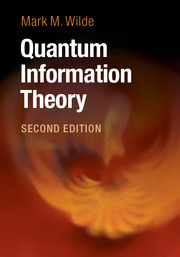Book contents
- Frontmatter
- Contents
- Preface to the Second Edition
- Preface to the First Edition
- How To Use This Book
- Part I Introduction
- Part II The Quantum Theory
- Part III Unit Quantum Protocols
- Part IV Tools of Quantum Shannon Theory
- 9 Distance Measures
- 10 Classical Information and Entropy
- 11 Quantum Information and Entropy
- 12 Quantum Entropy Inequalities and Recoverability
- 13 The Information of Quantum Channels
- 14 Classical Typicality
- 15 Quantum Typicality
- 16 The Packing Lemma
- 17 The Covering Lemma
- Part V Noiseless Quantum Shannon Theory
- Part VI Noisy Quantum Shannon Theory
- Appendix A Supplementary Results
- Appendix B Unique Linear Extension of a Quantum Physical Evolution
- References
- Index
15 - Quantum Typicality
from Part IV - Tools of Quantum Shannon Theory
Published online by Cambridge University Press: 16 February 2017
- Frontmatter
- Contents
- Preface to the Second Edition
- Preface to the First Edition
- How To Use This Book
- Part I Introduction
- Part II The Quantum Theory
- Part III Unit Quantum Protocols
- Part IV Tools of Quantum Shannon Theory
- 9 Distance Measures
- 10 Classical Information and Entropy
- 11 Quantum Information and Entropy
- 12 Quantum Entropy Inequalities and Recoverability
- 13 The Information of Quantum Channels
- 14 Classical Typicality
- 15 Quantum Typicality
- 16 The Packing Lemma
- 17 The Covering Lemma
- Part V Noiseless Quantum Shannon Theory
- Part VI Noisy Quantum Shannon Theory
- Appendix A Supplementary Results
- Appendix B Unique Linear Extension of a Quantum Physical Evolution
- References
- Index
Summary
This chapter marks the beginning of our study of the asymptotic theory of quantum information, where we develop the technical tools underpinning this theory. The intuition for it is similar to the intuition we developed in the previous chapter on typical sequences, but we will find some important differences between the classical and quantum cases.
So far, there is not a single known information-processing task in quantum Shannon theory where the tools from this chapter are not helpful in proving the achievability part of a coding theorem. For the most part, we can straightforwardly import many of the ideas from the previous chapter about typical sequences for use in the asymptotic theory of quantum information. However, one might initially think that there are some obstacles to doing so. For example, what is the analogy of a quantum information source? Once we have established this notion, how would we determine if a state emitted from a quantum information source is a typical state? In the classical case, a simple way of determining typicality is to inspect all of the bits in the sequence. But there is a problem with this approach in the quantum domain—“looking at quantum bits” is equivalent to performing a measurement and doing so destroys delicate superpositions that we would want to preserve in any subsequent quantum information-processing task.
So how can we get around the aforementioned problem and construct a useful notion of quantum typicality? Well, we should not be so destructive in determining the answer to a question when it has only two possible answers. After all, we are only asking “Is the state typical or not?”, and we can be a bit more delicate in the way that we ask this question. As an analogy, suppose Bob is curious to determine whether Alice could join him for dinner at a nice restaurant on the beach. He would likely just phone her and politely ask, “Sweet Alice, are you available for a lovely oceanside dinner?”, as opposed to barging into her apartment, probing through all of her belongings in search of her calendar, and demanding that she join him if she is available.
Information
- Type
- Chapter
- Information
- Quantum Information Theory , pp. 443 - 466Publisher: Cambridge University PressPrint publication year: 2017
